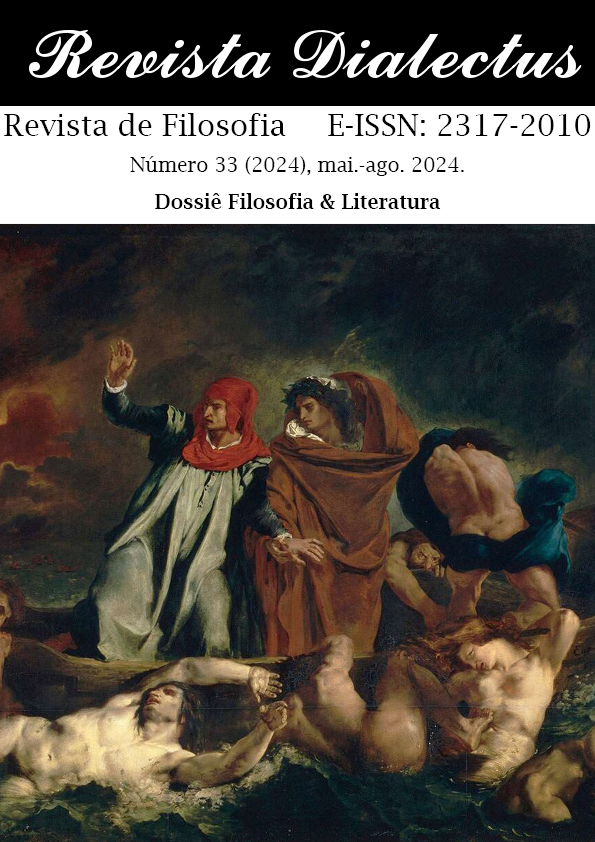ENTRE “ESPÍRITO E VIDA” E “O PRIMEIRO HOMEM DA SOCIEDADE”: A LITERATURA NA FILOSOFIA DE ERIC WEIL
DOI:
https://doi.org/10.30611/33n33id94057Keywords:
Eric Weil, Filosofia, Literatura, Descrição, CompreensãoAbstract
O artigo expõe as ideias de Eric Weil sobre literatura em dois diferentes momentos de sua obra. No primeiro, o texto se volta a “Espírito e vida”, debate entre Weil e o crítico literário Rudolf Kayser sobre duas noções fundamentais tanto para a filosofia quanto para a literatura. No segundo momento, o foco é na leitura das últimas páginas da categoria da condição na Lógica da filosofia, onde Weil trata do papel da arte, especialmente da literatura, em um mundo moldado pelas ciências e pelas exigências do mecanismo social. Nesse contexto, ele destaca o escritor como “o primeiro homem da sociedade”, encarregado de descrever a realidade e suas contradições. Embora distintas, ambas as análises enfatizam a diferença entre a perspectiva do escritor e a visão do filósofo. O objetivo do artigo é, enfim, explorar aspectos essenciais da natureza e da missão da filosofia por meio da relação de Weil com a literatura, considerando também a expressão “primeiro homem da sociedade” em confronto com pontos particulares da obra de Robert Musil.
Downloads
References
BARALE, M. Eric Weil: morale e política. In: Atti della giornata di studi presso l’Instituto italiano per gli studi filosofici. Urbino: Quattro Venti, 1989, p. 27-58.
BONNET, J. Un homme en projet. In: L’Arc, n. 74, 1990, p. 1-4.
BORRALHO, H. Filosofia e ‘literatura’ em Eric Weil. In: PERINE et al. (orgs.). Pensamento e história. Michel Foucault, Paul Ricœur, Eric Weil. São Paulo: É Realizações, 2020, p. 319-334.
BOUVERESSE, J. La voix de l’âme et les chemins de l’esprit. In: Dix études sur Robert Musil. Paris: Seuil, 2001.
BOUVERESSE, J. Robert Musil. L’homme probable, le hasard, la moyenne et l’escargot de l’histoire. Paris: L’Éclat, 2004.
BOUVERESSE, J. La tâche de la littérature et la formation social de l’écrivain. In: PINTO, E. (Dir.). L’écrivain, le savant et le philosophe. La littérature entre philosophie et sciences sociales. Paris: Éditions de la Sorbonne, 2003, p. 87-110.
BOUVERESSE, J. La connaissance de l’Écrivain. Sur la littérature, la vérité et la vie. Marseille: Agone, 2008.
BOUVERESSE, J. Le mythe moderne du progrès. Paris: Agone, 2017.
CASSIRER, E. A filosofia das formas simbólicas. Terceira parte: fenomenologia do conhecimento. Trad. E. de Souza. São Paulo: Martins Fontes, 2011.
CASSIRER, E.; HEIDEGGER, M. Dibattito di Davos tra Ernst Cassirer e Martin Heidegger. In: HEIDEGGER, M. Kant e il problema della metafisica. Trad. M. Reina. Roma; Bari: Laterza, 1981, p. 219-236.
COMETTI, J.-P. L’homme exact. Essai sur Robert Musil. Paris: Seuil, 1997.
DELIGNE, A. L’itinéraire philosophique du jeune Eric Weil. Hambourg – Berlim – Paris. Villeneuve d’Ascq: Presses Universitaires du Septentrion, 2022.
DUMONT, J.-P. Protreptique et initiation à la philosophie antique (Entrentien avec Eric Weil). In: Cahiers Eric Weil 2. Eric Weil et la pensée antique. Lille: Presses Universitaires de Lille, 1989, p. 35-50.
KAYSER, R. Kant. Vienne; Leipzig: Phaidon, 1935.
KAYSER, R. Spinoza Bildnis eines geistien Helden. Vienne; Leipzig: Phaidon, 1932.
LESSA, B. Sem qualidade. In: MUSIL, R. O Homem sem qualidades. Trad. L. Luft e C. Abbenseth. Rio de Janeiro: Nova Fronteira, 2006, p. 19-22.
MUSIL, R. Journaux. Traduction établie et présentée par Philippe Jacconttet d’après l’édition allemand d’Adolf Frisé. Paris: Seuil, 1981.
MUSIL, R. O Homem sem qualidades. Trad. L. Luft e C. Abbenseth. Rio de Janeiro: Nova Fronteira, 2006.
PLATÃO. A República. Tradução Maria Helena da Rocha Pereira. Lisboa: Fundação Calouste Gulbenkian, 2017.
RAIMONDI, E. Poesia e Filosofia nella Logique de la Philosophie. Dradek. Studies in Philosophy of Literature and New Media Theories, v. 1, n. 2, 2015, p. 7-45.
SARAMAGO, J. Ensaio sobre a cegueira. São Paulo: Companhia das Letras, 1995.
WEIL, E. Action, littérature et philosophie mystiques. A. Huxley, The perenniel philosophy. A. Huxley, La paix, la liberté (trad. J. Castier)”. Critique, v. 3, 1947, p. 172-187.
WEIL, E. L’histoire littéraire et l’érudition. Ernst R. Curtius, Europäische Literatur und lateinisches Mittelalter. Critique, v. 6, 1950, p. 37-45.
WEIL, E. Lógica da filosofia. Trad. L. Malimpensa. São Paulo: É Realizações, 2012.
WEIL, E. Hegel e nós. Organização VALDÉRIO, F. et al. Caxias do Sul: EDUCS, 2019.
WEIL, E. A filosofia é científica?. Trad. J. Castelo Branco. Unisinos, v. 22, n. 2, 2021, p. 1-11.
WEIL, E.; KAYSER, R. Esprit et vie – Un dialogue sur philosophie et littérature. In: DELIGNE, A. L’itinéraire philosophique du jeune Eric Weil. Hambourg – Berlim – Paris. Villeneuve d’Ascq: Presses Universitaires du Septentrion, 2022, p. 459-480.
Downloads
Published
Issue
Section
License
Copyright (c) 2024 Judikael Castelo Branco

This work is licensed under a Creative Commons Attribution-NonCommercial-NoDerivatives 4.0 International License.
Authors who publish in this journal agree to the following terms:
- Authors retain the copyright and grant the journal the right of first publication, with the work simultaneously licensed under the Attribution-NonCommercial-NoDerivatives 4.0 International (CC BY-NC-ND 4.0) License, which allows the non-commercial sharing of work, without modifications and with acknowledgment of authorship and initial publication in this journal.
- Authors are authorized to take additional contracts separately, for non-exclusive distribution of the version of the work published in this journal (eg publish in institutional repository or as a book chapter), with acknowledgment of authorship and initial publication in this journal.
- Authors are allowed and encouraged to publish and distribute their work online (eg in institutional repositories or on their personal page) at any point before or during the editorial process, as this can generate productive changes as well as increase the impact and citation of published work (See The Free Access Effect).



















